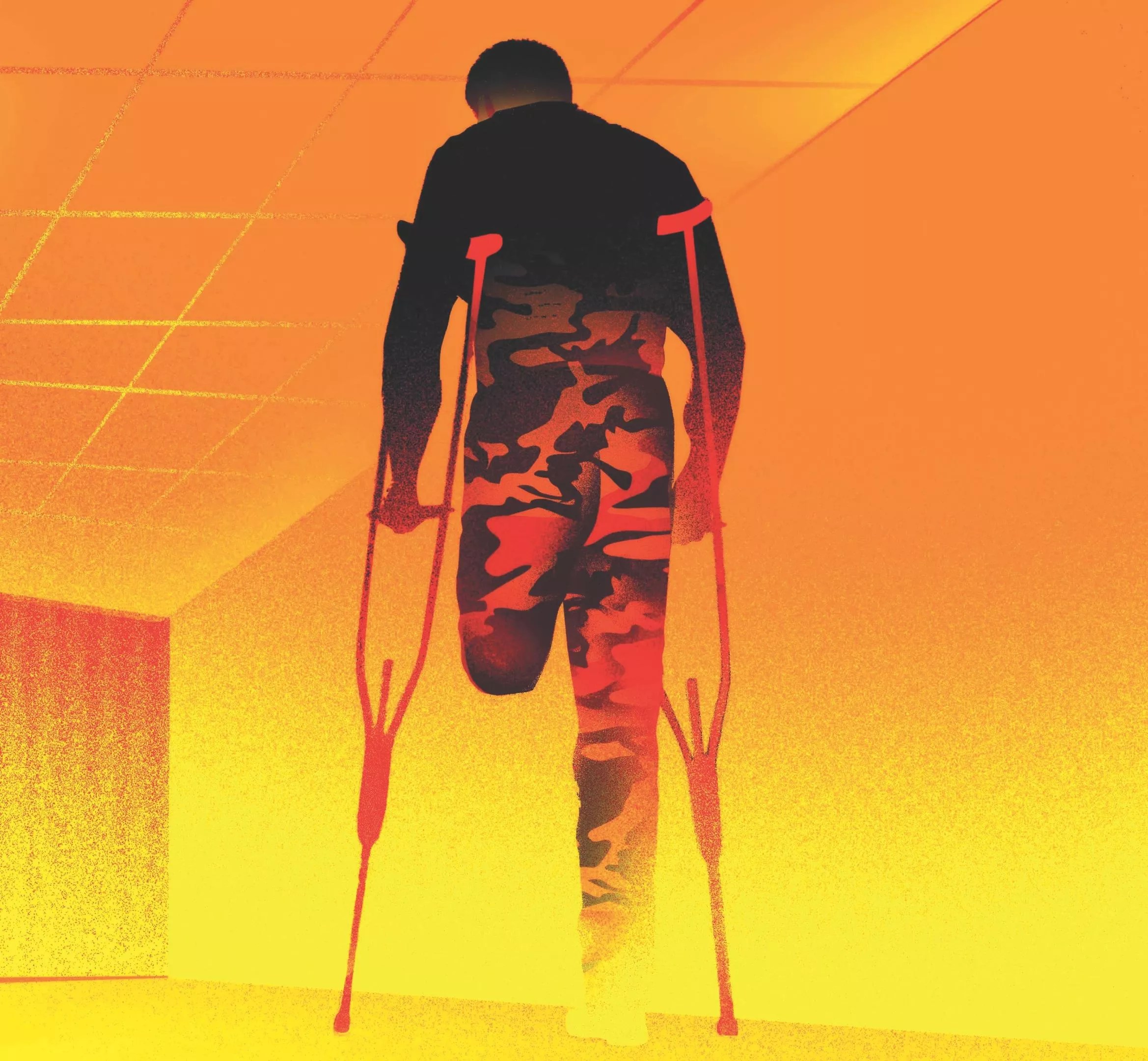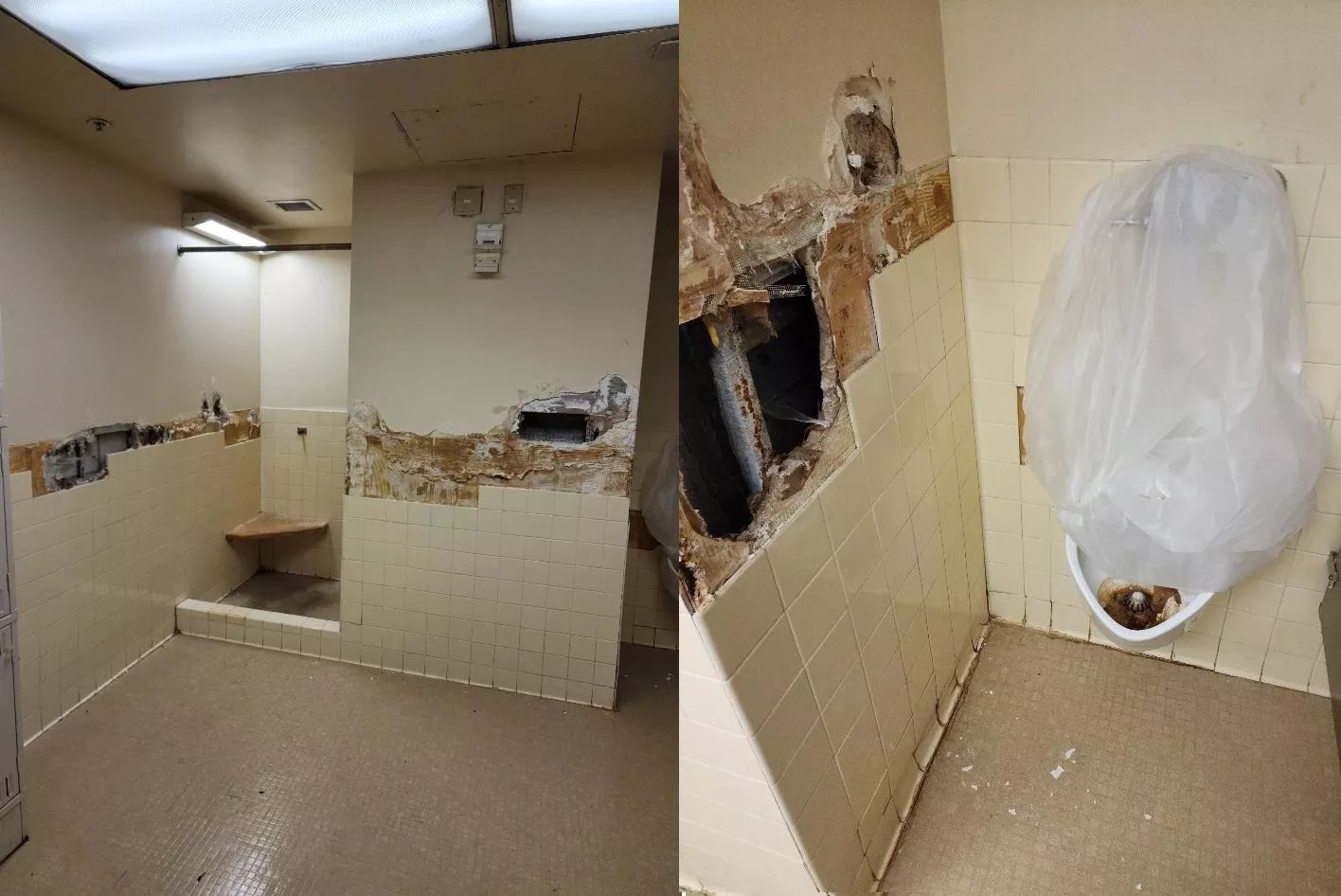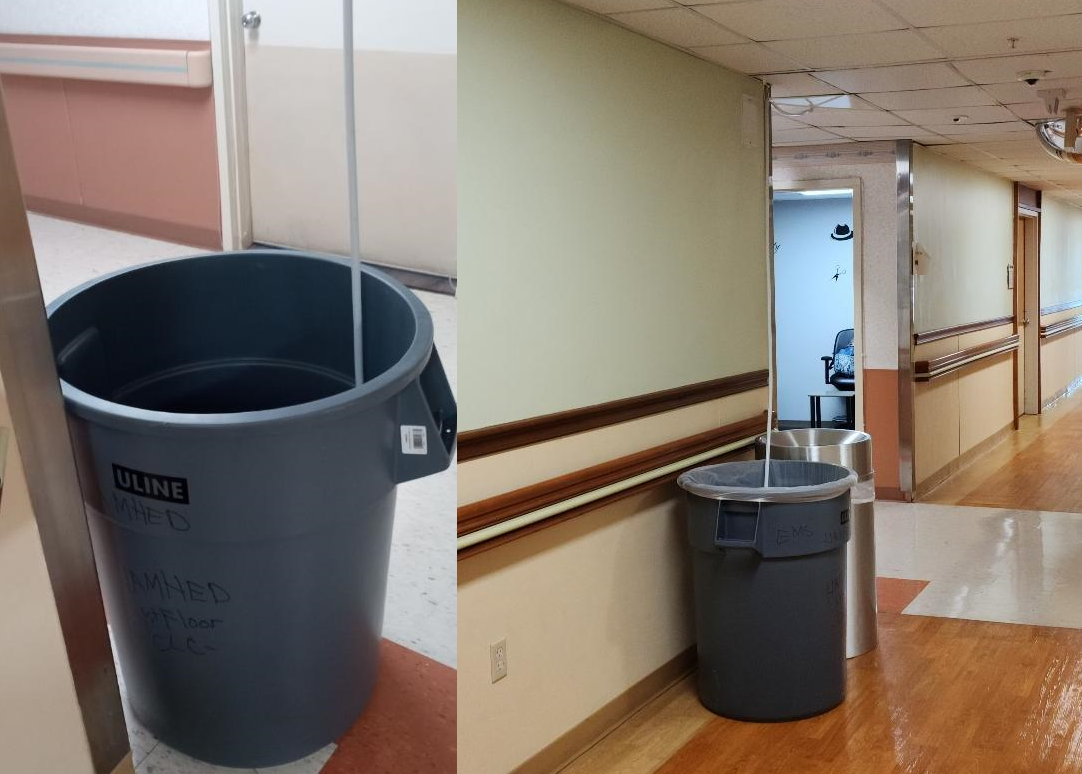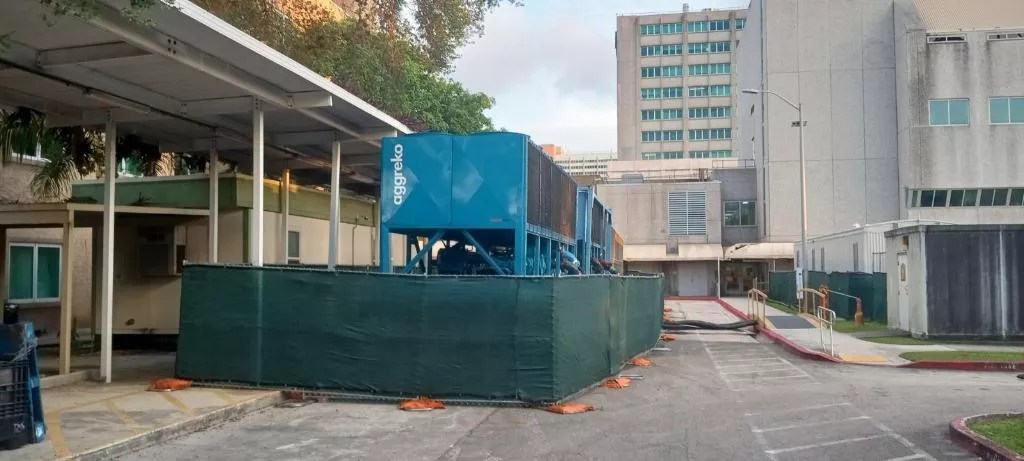
Illustration by Brian Stauffer

Audio By Carbonatix
After an air-conditioning failure at Miami’s veterans’ hospital left medical workers drenched in sweat and stewing in oppressive heat and humidity last August, hospital administrators convened a virtual staff meeting to assure the team that the breakdown hadn’t affected patient care.
Several staff members who attended say the message contradicted what they’d seen on the front lines at the Bruce W. Carter Department of Veterans Affairs (VA) Medical Center.
Medical workers tell New Times that floors were shut down and patients were shuttled between units before the VA rushed in industrial-size chillers to cool the 56-year-old building. Amid the mayhem, the workers say, severely ill veterans were stranded in areas that lacked the proper medical equipment to monitor and treat them.
The administration’s stance – that there were “no patient safety issues” during the breakdown – struck the local nurses’ union as emblematic of how management has downplayed infrastructure issues at the Miami VA for years.
“It’s like they are just checking boxes sometimes – and going through this without really thinking and understanding that we’re in a very human business where lives are at stake,” says Bill Frogameni, a registered nurse and director of the Miami VA branch of National Nurses United.

The VA brought in temporary chillers after the air conditioning broke down in August 2023.
Photo by Bill Frogameni
A year later, staff members say, the temporary chillers remain on site, a reminder of the disrepair into which the building fell. The workers say that while parts of the medical center appear in good shape for their age, if you turn the wrong corner or open the wrong door, the veneer disappears. Some bathroom facilities, for example, have been abandoned, leaving behind walls marred by gaping holes, stained fixtures, missing tiles, and nonfunctioning plumbing.

An abandoned bathroom on the first floor of the Miami VA hospital
Photo by Miami VA staff member
The hospital has also been siphoning water into trash cans and other receptacles to mitigate damage from persistent roof leaks for more than a year. The liquid is routed through a network of clear plastic tubes that snake down from the ceilings into the makeshift catch basins.
The leaks led to a shutdown of a medical wing on the 12th floor in early 2024 and an urgent call to carry out roof repairs. According to the VA’s regional office, the leak-collection system was deployed pending permanent roof fixes, which have yet to be completed.
Workers at the medical center have been in contact with New Times in recent months, providing photographs and accounts of conditions inside the building, located on a 26-acre campus just west of Overtown. Several staffers say the AC failed repeatedly at the facility last summer and in years past, including an earlier breakdown in June 2023 that left doctors’ offices in sweltering temperatures for weeks.
“A manager tried to tell us that we weren’t setting the thermostat correctly.”
One former Miami VA doctor who worked at the medical center during last year’s heat wave says the hospital administration suggested the staff was to blame for the soaring temperatures inside. “A manager tried to tell us that we weren’t setting the thermostat correctly,” he recalls.
A nurse summed up the situation in one word: “disappointing.”
“We are trying to show veterans that the VA is the better choice for them. But when you look at how much better equipped and maintained other hospitals are than the Miami VA, you ask yourself why the private sector can do it but the VA can’t,” the nurse, who has been working at the VA for five years, tells New Times. (Both medical workers asked that their names not be published for fear of future employment repercussions.)

Garbage cans are deployed at the Miami VA to catch water from long-term roof leaks.
Photo by Miami VA staff member
New Times reviewed budget documents indicating that the VA’s Florida regional office, Veterans Integrated Services Network 8 (VISN 8), was aware of major infrastructure deficiencies at the hospital for a decade before the AC breakdowns last year. In fact, upgrades to the system were planned as far back as 2013. The projects were subject to yearslong delays, leaving the hospital to contend with repeated cooling failures in the summer months.
In a statement responding to questions from New Times, VISN 8 says AC upgrades are “currently in design with an estimated design completion by December 2024.”
“The Miami VA is fortunate to be supported appropriately, as needed, for any emergent needs and is proud of the teams that are working hard to manage this large, complex infrastructure to ensure our patients and staff have a safe and welcoming environment,” the statement adds.
“Business as Usual”
Built in 1968, the Bruce W. Carter VA Medical Center serves thousands of veterans in South Florida and maintains more than 360 patient beds spread across the main hospital, community living center, spinal cord injury facility, and mental-health center.
Budget submissions show that of the dozens of renovation and construction projects planned at the hospital, many have yet to commence – a lumbering pace of modernization not uncommon at VA facilities nationwide. The 2023 fiscal year budget listed more than $200 million in estimated costs in a long-term plan for projects at the Miami VA.
Patrick Murray, legislative director of the nonprofit Veterans of Foreign Wars of the United States, more commonly known as the VFW, says the national budget shortfall for VA hospital construction and maintenance projects is mammoth and getting bigger. The upshot: Routine projects at aging facilities are being put off year after year, in some cases causing what would be moderately expensive repairs to snowball.
The VA’s 2023 budget for construction and maintenance amounted to roughly $5.5 billion. That may sound like a lot, but Murray notes that it’s a small slice of the $130 billion required to modernize the VA’s healthcare system nationwide.
“Bringing the VA hospital system up to date would be a massive undertaking and take a transformational amount of money. The system does not prioritize projects until things break and people’s health and safety are affected,” says Murray, who has testified to Congress about inadequate funding for veterans’ hospitals.
“The more you let these projects go, the worse they get,” he adds. “The work that needs to be done has skyrocketed, and they’re doing nowhere near enough to keep up with it. When a major incident hits the news, maybe Congress gets involved and they’ll fix that one issue. Meanwhile, another 100 are left to business as usual.”
When It Rained, It Poured – Into the Miami VA
The former Miami VA doctor says that although leaks were common knowledge among Miami VA staff, the 12th-floor hospital wing shutdown caught them by surprise. Several patient beds had to be taken out of commission owing to water damage.
“It wasn’t like a planned, structured closure,” the doctor explains. “Everything was so geared toward trying to paint these issues better than they are and skate over problems rather than ever actually addressing them.”
“So much of this has been from yearslong neglect and it’s just baffling why it was not dealt with.”
Containers filled with water from leaks have been a common sight in the hallways of the Miami VA complex over the past year. The roofs over the nursing home building and main hospital were dilapidated and in need of repair, by all accounts.
“You could walk the hospital and see drain hoses going into buckets,” union leader Frogameni says. “So much of this has been from yearslong neglect, and it’s just baffling why it was not dealt with. It’s not good for the vets, and it’s not good for the staff who serve the veterans.”
The regional VA office confirmed to New Times that beds were moved to a dry area earlier this year while temporary repairs addressed the leaks.
“Roof leaks have occurred during heavy rain events,” VISN 8 said in its statement. “Projects for the replacement of two roofs are on the upcoming operating plan.”
Asked whether the VA tackled that and other maintenance issues at the hospital in a timely fashion, VISN 8 responded, “The Miami VA leadership team, along with engineering and construction experts, regularly review the need for recurring maintenance and new construction projects. Projects are developed at the local facility level annually or more frequently if required. From there, project requests go through a formal approval process and then are executed by the medical center.”
The VA says permanent repairs are slated for completion on the nursing home roof in December 2024 and on the main roof by the fall of 2025.
The nurses union calls the progress a “good development.”

Water from persistent roof leaks continues to be routed into trash cans and other receptacles at the Miami VA hospital.
Photo by Miami VA medical worker
The doctor who spoke with New Times believes the VA can get away with deferring projects more easily than private hospitals because it has a “captive patient population.”
Federal data shows that out of 23 regions in the VA healthcare system nationwide, Florida has the sixth-highest percentage of veterans with incomes less than $35,000. A 2023 survey found that 30 percent of VA healthcare enrollees under the age of 45 and 24 percent of those between the ages of 45 and 64 had no alternate insurance.
“It’s easy to defer maintenance and upkeep if you’re not competing for commercial dollars. A lot of private healthcare is hospitality,” the former Miami VA doctor asserts. “The harsh reality is that if a private hospital was dealing with these issues, people wouldn’t go there.”
“Hospital-Wide Mess”
Medical workers and patients who’ve stayed at the Miami veterans’ hospital in recent years are familiar with air-conditioning failures in the middle of summer heat waves. Critical care nurse Riezel Paraiso, the associate director for National Nurses United in Miami, recalls that the AC system floundered during the COVID-19 pandemic, stifling proper airflow and ventilation deemed critical to stem the spread of the virus.
But when temperatures started climbing inside the medical center in August 2023, Paraiso and her colleagues realized the conditions were worse than ever.
The facility’s “spot coolers” – portable cooling devices brought in to compensate for the failing air conditioning – weren’t up to the task. The hospital temporarily halted elective surgeries. Two out of the Miami VA’s three medical-surgical units were shut down and patients were transferred en masse, creating a situation that nurses’ union leader Bill Frogameni describes as “a hospital-wide mess.”
One patient who was thought to have an aortic aneurysm was transferred to a nursing home-style unit that lacked telemetry devices needed to monitor his heart activity, respiratory rate, and oxygen levels, according to the union.
Paraiso and the since-departed physician who spoke to New Times both recall that while the hospital scrambled to restore the AC, some patients were held in the emergency department for more than a day – a breach of medical standards, which require prompt triage and transfer of patients to appropriate units. (Emergency departments are meant to stabilize patients, not provide extended treatment, since they are not always equipped with staff and resources to provide specialized care, according to the doctor.)

Emergency chiller units outside Bruce Carter VA Medical Center. The temporary cooling systems remain in place as of August 2024.
Photo by Bill Frogameni
The two medical workers say the hospital administration’s attempt to downplay the severity of the situation frustrated them as much, if not more, than the air-conditioning breakdown itself. While briefing staff in a town hall-style meeting a few days after the air conditioning failed in August 2023, the director of the Miami VA Healthcare System claimed “no patient safety issues” arose from the breakdown.
“The biggest problem is that there are issues, and rather than address the issues, it was a constant reaction of trying to cover it up and spin it,” the since-departed doctor says.
Adds Frogameni, “Contrary to what the administration has been at pains to say, clearly patients were in danger. Clearly, safety was compromised.”
Documents reviewed by New Times show that AC repairs at the medical center had lingered on the VA’s repair list for a decade. And as the years passed, the cost of planned upgrades crept higher and higher.
A planned infrastructure upgrade that included the installation of new air-conditioning chillers, water pumps, and a chiller for drinking water appeared on a fiscal year 2014 budget submission at a cost of $2.35 million. Six years later, the budgeted price tag to address the deficiencies and increase cooling capacity was pegged at $7.7 million. Plans to replace the chillers reappeared in the VA budget in March 2021 and again in early 2023 – by which time the tab had risen to $9.9 million.
Though the temporary units brought in last August restored reasonable temperatures in the hospital, the nurse’s union says spot coolers have remained in place, namely around patient rooms prone to heat up from windows facing the afternoon sun.
In response to questions from New Times, VISN 8 says the August 2023 AC failure resulted from a breakdown during routine maintenance.
To this day, the VA maintains that patient care wasn’t significantly affected.
“We are happy to report that there were no major disruptions to care or services,” the regional office stated.
Critical Projects SCIP’ed
Failing infrastructure at VA facilities isn’t unique to Miami.
The median age of a VA acute-care medical center in the U.S. is 58 years. Many date back even further, to the post-World War II era. The Department of Veterans Affairs operates more than 170 hospitals that serve more than nine million veterans.
According to the Independent Budget veterans’ service organizations – which collectively make funding recommendations to the VA on behalf of the Disabled American Veterans, Paralyzed Veterans of America, and the VFW – the VA’s healthcare system has amassed a backlog of roughly $20 billion in repairs and other nonrecurring maintenance projects nationwide.
“I worked for a general contractor for years and witnessed problems with national infrastructure firsthand – what the true need is versus the pitiful amounts of dollars we throw at these things. The VA is no different,” the VFW’s Patrick Murray tells New Times. “What would have cost you a dollar today is going to cost you two dollars tomorrow. That’s VA construction in a nutshell.”
In 2010, the VA implemented the Strategic Capital Investment Planning (SCIP) program, which was designed to streamline the process of maintaining VA facilities. Under SCIP, regional offices assign scores to projects based on their impact on improving patient care, treatment access, and infrastructure, among other criteria.
Murray and Veterans of Foreign Wars have criticized the system, contending that it pits aspects of VA services against one another, forcing the agency to choose between adequately funding maintenance, construction, and veterans’ benefits.
“At best, SCIP provides nonbinding suggestions to the VA budget process, which are regularly ignored, resulting in an ever-increasing backlog of overdue maintenance and construction projects,” the group said in a statement in response to the VA’s 2023 fiscal year budget. “Furthermore, as long as funding for VA infrastructure remains part of its discretionary budget, it must compete with other VA healthcare and benefit delivery priorities in an era of rising deficits and debt, budget caps, and sequestration.”
The Independent Budget collective has cautioned that cooling-system upgrades, in particular, might fall by the wayside.
“The need for heating and cooling system repairs, or generator upgrades, may not immediately stand out as critical, but failures of these systems could lead to life safety issues,” the group warned in 2019.
The VA says it “determines the relative criticality” of projects “after a rigorous evaluation process.”
The VA maintains that the system objectively prioritizes projects with respect to funding resources: “The process determines the relative criticality of projects for the budget year, and long-range potential projects, after a rigorous evaluation process using specific criteria.”
As it happened, plans for major repairs the Miami VA medical staff deemed essential appeared on the SCIP list, only to face delays. The chiller upgrade, which ranked 160th out of 582 one-time maintenance projects on the 2020 budget, is still in the design stage.
Meanwhile, Frogameni says some bathrooms at the hospital remain in a dilapidated state, with the worst of them located on the first floor in the community living center. The union leader claims that the restroom, which staff members no longer use, has been in that condition for as long as he can recall.
Another staff bathroom on the second floor, which is still in use, had peeling finishes on the ceiling and a detached sink sitting on the floor for years, Frogameni says. It was recently patched up, though a toilet remains wrapped in plastic and out of commission.
In Murray’s view, even if the VA received the tens of billions of dollars required to upgrade its infrastructure nationwide, delays would persist unless the administration hires an army of new managers to help initiate and oversee projects. His group has recommended hiring 350 new employees for that task – a number that does not include adding necessary personnel at individual hospitals.

A second-floor bathroom at Bruce W. Carter Department of Veterans Affairs (VA) Medical Center before repairs were carried out
Photo by Bill Frogameni
“We Are There to Give Back”
In recent years, the debate over how to modernize the Veterans Health Administration and its facilities has grown as heated as the Miami VA during an air-conditioning breakdown.
In 2022, Congress stymied a federal initiative that sought to close down dozens of VA medical centers and privatize a significant portion of veterans’ care. The plan would have abandoned the Miami VA and constructed a new, smaller facility, in part to reflect an ongoing decrease in the veteran population. Opponents decried it as an attempt to drastically downsize VA hospital care and divert dollars to private companies to the detriment of veterans.
With the Bruce W. Carter VA Hospital slated to remain open for the foreseeable future, projects to upgrade the campus are still on the table.
The current list includes improvements to the facility’s critical-care unit and surgical suites – steps the former VA physician who spoke to New Times sees as encouraging.
“One thing people have to understand: We love what we do,” says the nurse who declined to be named in this story. “We love the VA. We love the veterans, and we appreciate the sacrifice that they made. That’s why we are here to give back. A lot of them are dealing with issues that other people do not have because of the sacrifices they made: homelessness, mental issues, medical issues related to their service – the VA has done so much for them, and we can appreciate that.
“It’s the lack of investment and attention to infrastructure – that’s what caused the big problems,” the nurse adds. “There’s a lot of politics, red tape – there’s that side of it. I don’t think it should be that difficult.”